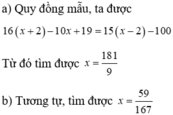

a)
4...">
Hãy nhập câu hỏi của bạn vào đây, nếu là tài khoản VIP, bạn sẽ được ưu tiên trả lời. a) 7x - 35 = 0 <=> 7x = 0 + 35 <=> 7x = 35 <=> x = 5 b) 4x - x - 18 = 0 <=> 3x - 18 = 0 <=> 3x = 0 + 18 <=> 3x = 18 <=> x = 5 c) x - 6 = 8 - x <=> x - 6 + x = 8 <=> 2x - 6 = 8 <=> 2x = 8 + 6 <=> 2x = 14 <=> x = 7 d) 48 - 5x = 39 - 2x <=> 48 - 5x + 2x = 39 <=> 48 - 3x = 39 <=> -3x = 39 - 48 <=> -3x = -9 <=> x = 3 \(\frac{x-3}{5}-\frac{2x-1}{10}=\frac{x+1}{2}+\frac{1}{4}\) \(< =>\frac{\left(x-3\right).4}{20}-\frac{\left(2x-1\right).2}{20}=\frac{\left(x+1\right).10}{20}+\frac{5}{20}\) \(< =>4x-12-4x+2=10x+10+5\) \(< =>10x=-10-10-5=-25\) \(< =>x=-\frac{25}{10}=-\frac{5}{2}\) \(\frac{x+3}{2}-\frac{2x-1}{3}-1=\frac{x+5}{5}\) \(< =>\frac{\left(x+3\right).15}{30}-\frac{\left(2x-1\right).10}{30}-\frac{30}{30}=\frac{\left(x+5\right).5}{30}\)\(< =>15x+45-20x+10-30=5x+25\) \(< =>-5x+25=5x+25< =>10x=0< =>x=0\) a)\(2+\frac{3}{x-5}=1\) \(\Rightarrow\frac{3}{x-5}=-1\) \(\Rightarrow3=-x+5\) \(\Leftrightarrow x+3=5\) \(\Rightarrow x=2\) a, 8/x-8 + 11/x-11 = 9/x-9 + 10/ x-10 b, x/x-3 - x/x-5 = x/x-4 - x/x-6 c, 4/x^2-3x+2 - 3/2x^2-6x+1 +1 = 0 d, 1/x-1 + 2/ x-2 + 3/x-3 = 6/x-6 e, 2/2x+1 - 3/2x-1 = 4/4x^2-1 f, 2x/x+1 + 18/x^2+2x-3 = 2x-5 /x+3 g, 1/x-1 + 2x^2 -5/x^3 -1 = 4/ x^2 +x+1 a) \(\frac{x-1}{2}+\frac{x-2}{3}+\frac{x-3}{4}=\frac{x-4}{5}+\frac{x-5}{6}\) \(\left(\frac{x-1}{2}+1\right)+\left(\frac{x-2}{3}+3\right)+\left(\frac{x-3}{4}+1\right)=\left(\frac{x-4}{5}+1\right)+\left(\frac{x-5}{6}+1\right)\) \(\frac{x-1}{2}+\frac{x-1}{3}+\frac{x-1}{4}=\frac{x-1}{5}+\frac{x-1}{6}\) \(\left(x-1\right)\left(\frac{1}{2}+\frac{1}{3}+\frac{1}{4}+\frac{1}{5}+\frac{1}{6}\right)\)=0 \(x-1=0\) \(x=1\) 1) (2x - 3)2 = 4x2 - 8 <=> 4x2 - 12x + 9 = 4x2 - 8 <=> 12x + 9 = -8 <=> 12x = -17 <=> x = 17/12 1) (2x - 3)^2 = 4x^2 - 8 <=> 4x^2 - 12x + 9 = 4x^2 - 8 <=> 4x^2 - 12x + 9 - 4x^2 = -8 <=> -12x + 9 = -8 <=> -12x = -8 - 9 <=> -12x = -17 <=> x = 17/12 2) x - (x + 2)(x - 3) = 4 - x^2 <=> x - x^2 + 3x - 2x + 6 = 4 - x^2 <=> 2x - x^2 + 6 = 4 - x^2 <=> 2x - x^2 + 6 + x^2 = 4 <=> 2x + 6 = 4 <=> 2x = 4 + 6 <=> 2x = 10 <=> x = 5 3) 3x - (x - 3)(x + 1) = 6x - x^2 <=> 3x - x^2 - x + 3x + 3 = 6x - x^2 <=> 5x - x^2 + 3 = 6x - x^2 <=> 5x - x^2 + 3 + x^2 = 6x <=> 5x + 3 = 6x <=> 3 = 6x - 5x <=> 3 = x 4) 3x/4 = 6 <=> 3x = 6.4 <=> 3x = 24 <=> x = 8 5) 7 + 5x/3 = x - 2 <=> 21 + 5x = 3x - 6 <=> 5x = 3x - 6 - 21 <=> 5x = 3x - 27 <=> 5x - 3x = -27 <=> 2x = -27 <=> x = -27/2 6) x + 4 = 2/5x - 3 <=> 5x + 20 = 2x - 15 <=> 5x + 20 - 2x = -15 <=> 3x + 20 = -15 <=> 3x = -15 - 20 <=> 3x = -35 <=> x = -35/3 7) 1 + x/9 = 4/3 <=> x/9 = 4/3 - 1 <=> x/9 = 1/3 <=> x = 3 Nhìn sơ qua thì thấy bài 3, b thay -2 vào x rồi giải bình thường tìm m Bài 2: a) \(x+x^2=0\) \(\Leftrightarrow x\left(x+1\right)=0\) \(\Leftrightarrow\hept{\begin{cases}x=0\\x+1=0\end{cases}}\)\(\Leftrightarrow\hept{\begin{cases}x=0\\x=0-1\end{cases}}\)\(\Leftrightarrow\hept{\begin{cases}x=0\\x=-1\end{cases}}\) b) \(0x-3=0\) \(\Leftrightarrow0x=3\) \(\Rightarrow vonghiem\) c) \(3y=0\) \(\Leftrightarrow y=0\) \(\frac{25x-655}{95}-\frac{5\left(x-12\right)}{209}=\frac{89-3x-\frac{2\left(x-18\right)}{5}}{11}\) \(< =>\frac{5x-131}{19}=\frac{1631-52x-\frac{38x-684}{5}}{209}\) \(< =>\left(5x-131\right)209=\left(1631-52x-\frac{38x-684}{5}\right)19\) \(< =>55x-1441=1631-52x-\frac{38x-684}{5}\) \(< =>3072-107x=\frac{38x-684}{5}\) \(< =>\left(3072-107x\right)5=38x-684\) \(< =>15360-535x-38x-684=0\) \(< =>14676=573x< =>x=\frac{14676}{573}=\frac{4892}{191}\) nghệm xấu thế \(\frac{8\left(x+22\right)}{45}-\frac{7x+149+\frac{6\left(x+12\right)}{5}}{9}=\frac{x+35+\frac{2\left(x+50\right)}{9}}{5}\) \(< =>\frac{8x+176}{45}-\frac{41x+817}{45}=\frac{11x+415}{45}\) \(< =>993-33x-11x-415=0\) \(< =>578=44x< =>x=\frac{289}{22}\) a) 0,25x+1,5=0 => x = (0 - 1,5) : 0,25 = -1,5 : 0,25 = -6 Vậy x = -6. b) 6,36−5,3x=0 => x = (0 + 6,36) : 5,3 = 6,36 : 5,3 =\(\dfrac{6}{5}=1,2\) c) 43x−56=12 => x = \(\left(\dfrac{1}{2}+\dfrac{5}{6}\right)\): \(\dfrac{4}{3}\) = \(\dfrac{4}{3}:\dfrac{4}{3}=1\) Vậy x = 1. d) −59x+1=23x−10 => \(\dfrac{-5}{9}x-\dfrac{2}{3}x=\dfrac{-11}{9}x=-10-1=-11\) => \(x=-11:\dfrac{-11}{9}=9\) Vậy x = 9.










Vậy x = 1,2.